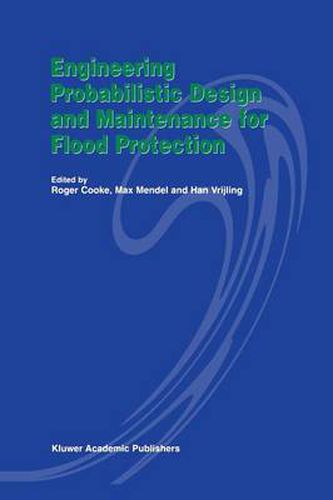Readings Newsletter
Become a Readings Member to make your shopping experience even easier.
Sign in or sign up for free!
You’re not far away from qualifying for FREE standard shipping within Australia
You’ve qualified for FREE standard shipping within Australia
The cart is loading…






This title is printed to order. This book may have been self-published. If so, we cannot guarantee the quality of the content. In the main most books will have gone through the editing process however some may not. We therefore suggest that you be aware of this before ordering this book. If in doubt check either the author or publisher’s details as we are unable to accept any returns unless they are faulty. Please contact us if you have any questions.
The First Conference on Engineering Probability in Flood Defense was orga nized by the Department of Mathematics and Informatics of the Delft U niver sity of Technology and the Department of Industrial Engineering and Opera tions Research of the University of California at Berkeley, and was held on June 1,2 1995 in Delft. Groups at Berkeley and Delft were both deeply engaged in modeling deterioration in civil structures, particularly flood defense structures. The plans for the conference were well under way when the dramatic floods in The Netherlands and California in the winter of 1994-1995 focused world attention on these problems. The design of civil engineering structures and systems is essentially an example of decision making under uncertainty. Although the decision making part of the process is generally acknowledged, the uncertainty in variables and param eters in the design problem is less frequently recognized. In many practical design procedures the uncertainty is concealed behind sharp probabilistic de sign targets like ‘once in a thousand years’ combined with a standardized use of safety factors. The choice of these probabilistic design targets, however, is based on an assessment of the uncertainty of the variable under consideration, and on its assessed importance. The value of the safety factor is governed by similar considerations. Standard practice is simply accu~ulated experience and engineering judgment. In light of the great number of civil engineering structures that function suc-. cessfully, one may say that this standard practice has proven itself broadly satisfactory.
$9.00 standard shipping within Australia
FREE standard shipping within Australia for orders over $100.00
Express & International shipping calculated at checkout
This title is printed to order. This book may have been self-published. If so, we cannot guarantee the quality of the content. In the main most books will have gone through the editing process however some may not. We therefore suggest that you be aware of this before ordering this book. If in doubt check either the author or publisher’s details as we are unable to accept any returns unless they are faulty. Please contact us if you have any questions.
The First Conference on Engineering Probability in Flood Defense was orga nized by the Department of Mathematics and Informatics of the Delft U niver sity of Technology and the Department of Industrial Engineering and Opera tions Research of the University of California at Berkeley, and was held on June 1,2 1995 in Delft. Groups at Berkeley and Delft were both deeply engaged in modeling deterioration in civil structures, particularly flood defense structures. The plans for the conference were well under way when the dramatic floods in The Netherlands and California in the winter of 1994-1995 focused world attention on these problems. The design of civil engineering structures and systems is essentially an example of decision making under uncertainty. Although the decision making part of the process is generally acknowledged, the uncertainty in variables and param eters in the design problem is less frequently recognized. In many practical design procedures the uncertainty is concealed behind sharp probabilistic de sign targets like ‘once in a thousand years’ combined with a standardized use of safety factors. The choice of these probabilistic design targets, however, is based on an assessment of the uncertainty of the variable under consideration, and on its assessed importance. The value of the safety factor is governed by similar considerations. Standard practice is simply accu~ulated experience and engineering judgment. In light of the great number of civil engineering structures that function suc-. cessfully, one may say that this standard practice has proven itself broadly satisfactory.